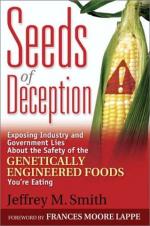|
This section contains 1,248 words (approx. 5 pages at 300 words per page) |

|
Gregory E. Pence
About the author: Gregory E. Pence teaches bioethics at the University of Alabama in Birmingham. He was the editor of The Ethics of Food. He has lectured worldwide and has published articles in the New York Times, the Wall Street Journal, and Newsweek.
Genetically engineered crops can solve the world's hunger problem. Traditional farming methods in developing countries, including organic farming, require too much land usage and will not be adequate for the growing world population, which is projected to be 8.3 billion by the year 2025. One crop expected to help in this area is genetically modified "golden rice," a rice that has been enhanced with beta-carotene and iron to improve its nutritional qualities. The development of another biotech rice that increases crop yields up to 35 percent will have a...
|
This section contains 1,248 words (approx. 5 pages at 300 words per page) |

|




